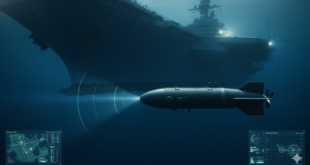Introduction:
The mysterious depths of the ocean have long captivated the human imagination, holding untold treasures, resources, and the promise of groundbreaking discoveries. In our quest to explore and understand the underwater world, technological advancements have played a pivotal role. One such groundbreaking innovation, quantum sensing, is now poised to revolutionize marine seismic acoustic technology, offering unparalleled accuracy, sensitivity, and resolution in underwater exploration. This blog article delves into the fascinating realm of quantum sensing and its transformative potential for marine exploration and seismic technology.
Understanding Quantum Sensing:
To grasp the essence of quantum sensing, we must first delve into the realm of quantum mechanics. Quantum mechanics, a branch of physics, delves into the behavior of particles at the atomic and subatomic level, where they exhibit wave-like properties. Quantum sensing harnesses these peculiar quantum phenomena to measure physical quantities with unprecedented accuracy and sensitivity.
Marine Seismic Acoustic Technology:
Marine seismic acoustic technology is a vital tool for exploring and mapping the seafloor, detecting subsurface features, and characterizing oil and gas reservoirs. It involves utilizing sound waves to create detailed images of the ocean floor and sub-surface geology. Seismic surveying is a critical tool used in the oil and gas industry to locate and extract valuable resources buried deep beneath the seabed. It involves using sound waves to create detailed images of the ocean floor and sub-surface geology.
However, conventional technology has limitations in terms of resolution, sensitivity, and range, particularly in deep waters and complex geological environments.
Marine seismic acoustic technology is also a crucial tool in maritime security, as it allows for the detection of underwater activities such as submarine movements and other vessel traffic. However, current systems have limitations in terms of range, accuracy, and ability to detect low signature vessels.
However, current technology has limitations in terms of resolution, range, and sensitivity, particularly in deep water and complex geological environments. This makes it challenging to accurately detect and characterize subsurface features, which can have significant economic and environmental implications, as well as potential negative impacts on marine life and the environment.
This is where quantum sensing comes in. By using quantum principles to measure the subtlest of changes in the environment, quantum sensors can detect underwater acoustic signals with unprecedented accuracy and sensitivity.
One of the key advantages of quantum sensing is its ability to detect very weak signals that would be missed by conventional sensors. This makes it possible to detect and track underwater objects over much greater distances, providing a critical advantage in the battle for maritime security.
The need for advanced underwater acoustic detection technology is crucial in today’s world, as threats to maritime security continue to evolve. For example, enemy submarines can pose a serious threat to national security by conducting covert operations in territorial waters, disrupting shipping lanes, or even launching missile attacks.
Conventional acoustic sensors are limited by their sensitivity and range, making it difficult to detect and track underwater objects over long distances. This is where quantum sensing comes in. By using quantum principles to measure the subtlest of changes in the environment, quantum sensors can detect underwater acoustic signals with unprecedented accuracy and sensitivity.
Moreover, quantum sensing technology is not limited to marine applications. It has many other potential uses, including in medical imaging, environmental monitoring, and even space exploration.
For a deeper understanding of quantum sensing technology to marine applications please visit: Quantum Sensing in Marine Seismic Acoustic Technology: Revolutionizing Underwater Exploration and Security
Ultra-Sensitive Seismometers:
One of the most exciting applications of quantum sensing in marine seismic technology is the development of ultra-sensitive seismometers. These quantum-enhanced devices can detect even the tiniest earthquakes, providing valuable insights into seismic activity and geological processes. Improved seismic data acquisition can lead to more precise mapping of the seafloor and better identification of potential oil and gas reserves.
Advancements in Sonar Systems:
Quantum sensors also offer immense promise for enhancing sonar systems. By leveraging quantum mechanics, sonar technology can achieve higher accuracy and longer range, enabling more effective tracking of submarines and underwater vehicles. This has far-reaching implications for bolstering maritime security and defense capabilities.
Quantum-Enhanced Acoustic Imaging:
Acoustic imaging with quantum enhancement presents another exciting avenue for marine exploration. The unparalleled resolution of quantum-enhanced acoustic images can provide detailed insights into the seafloor’s geological features and marine life. This level of clarity enhances our understanding of marine ecosystems and helps make informed decisions for environmental conservation.
Quantum Technology Sciences Signs DARPA Contract to Advance Marine Seismic Acoustic Technology
Quantum Technology Sciences (QTS), a provider of advanced detection and surveillance solutions, has recently signed a contract with the Defense Advanced Research Projects Agency (DARPA) to advance marine seismic acoustic technology. This innovative technology aims to address the current challenges faced by marine seismic surveying and enhance the accuracy and resolution of acoustic data acquisition.
The goal is to create an underwater acoustic sensor network that can detect and track marine vessels, as well as provide early warning of potential security threats.
The DARPA contract is a significant milestone in the development of advanced marine seismic acoustic technology, and Quantum Technology Sciences is well-positioned to lead the way in this exciting field. By overcoming the current challenges and developing innovative solutions, this technology could revolutionize the way we explore and extract resources from the ocean floor, as well as enhance our national security and defense capabilities.
However, the development of this technology also poses challenges, including the need to develop highly sensitive and robust sensors capable of withstanding the harsh marine environment. Quantum Technology Sciences aims to address these challenges by leveraging its expertise in quantum technology and developing innovative solutions to enhance the performance and reliability of marine seismic acoustic sensors.
In addition to its benefits for the oil and gas industry, this technology could also have significant applications for national security and defense. Improved acoustic data acquisition could help to detect and locate submerged objects, such as submarines and underwater drones, and enhance the monitoring of shipping lanes and other strategic waterways.
The new technology being developed by QTS aims to overcome these challenges by leveraging quantum sensing capabilities. Quantum sensing is a cutting-edge technology that uses the principles of quantum mechanics to detect and measure physical phenomena with high precision and sensitivity.
In this case, QTS will use quantum sensing to develop new sensors that can detect underwater acoustic signals with greater accuracy and over longer ranges. The sensors will also be designed to detect low signature vessels, which are typically difficult to detect with traditional acoustic systems.
In addition to its potential applications, the development of quantum sensors for marine seismic acoustic technology is an important step forward in the field of quantum technology. Quantum technology is an emerging field that has the potential to revolutionize many industries, including computing, communications, and sensing. By developing quantum sensors for marine seismic acoustic technology, QTS and DARPA are contributing to the advancement of this field and demonstrating the potential of quantum technology to solve real-world problems.
The development of advanced marine seismic acoustic technology could greatly improve the efficiency and safety of this process. By using quantum technology, scientists hope to enhance the sensitivity and accuracy of acoustic sensors and improve the resolution of the data collected. This could lead to more precise mapping of the seafloor and better identification of potential oil and gas reserves.
The ultimate goal of this technology is to provide enhanced situational awareness for maritime security personnel, enabling them to quickly detect and respond to potential threats.
Applications beyond Marine Exploration:
The potential of quantum sensing goes beyond marine exploration. Quantum technologies have a wide range of applications, including medical imaging, environmental monitoring, and even space exploration. In the medical field, quantum-enhanced sensors can revolutionize diagnostic imaging, enabling early detection of diseases. In space exploration, quantum sensing can enhance remote sensing capabilities, providing unprecedented insights into celestial bodies and their environments.
Conclusion:
As quantum sensing continues to evolve, its transformative potential in marine seismic acoustic technology becomes increasingly evident. The marriage of quantum mechanics with marine exploration offers a gateway to understanding the world beneath the waves like never before. With quantum-enhanced sensors propelling us into uncharted territory, the possibilities for groundbreaking discoveries, sustainable resource management, and enhanced maritime security are boundless. Embracing this revolution in underwater exploration is a bold step toward unveiling the secrets of our oceans and ensuring a brighter, more sustainable future for generations to come.
References and Resources also include:
 International Defense Security & Technology Your trusted Source for News, Research and Analysis
International Defense Security & Technology Your trusted Source for News, Research and Analysis



